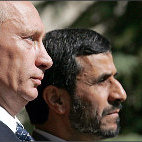Registration
You will receive an email confirming your registration.
IMGXYZ1196IMGZYXFor decades Russia defined its role in the Middle East in terms of relations with Iran, Iraq, and Syria. As a member of the Quartet -- composed of Russia, the United Nations, European Union, United States -- Russia's role in Middle East affairs was muted. With the 2006 war in Lebanon, the recent Gaza Crisis, and new economic interests in the region, a more proactive Russia has emerged, pursuing policies that are significantly different from those of the United States.
At a discussion hosted by Carnegie Europe and Young DGAP, Dmitri Trenin, Director of the Carnegie Moscow Center, and Marina Ottaway, Director of the Middle East Program at the Carnegie Endowment, discussed new dynamics and old superpower rivalries in the region.
Highlights included…
- On the apparent contradiction in Russia’s relationship with Iran, Dmitri Trenin explained that although Russia has an interest in preventing Iran from becoming a nuclear power, it has an even greater interest in preventing this growing regional power from becoming hostile. Marina Ottaway explained that the Gulf States fear of Iran’s growing supremacy.
- Trenin explained that the West has very little to fear from Russia’s involvement in Syria. Moscow does not intended to create a military alliance with Damascus to counterbalance U.S. power, rather it would like to build gas pipelines through Syria in order to become a major supplier of Middle Eastern energy.
- Marina Ottaway argued that improvements in the U.S. – Russia relationship will have very little bearing on the United States' relations in the Middle East. Tensions between the United States and Middle Eastern countries have nothing to do with Russia, and everything to do with U.S. policy towards the Arab-Israeli conflict.
